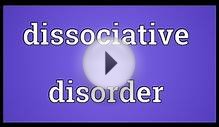
The term psychiatric disorder means a mental disorder or illness that interferes with the way a person behaves, interacts with others, and functions in daily life. Psychiatric disorders are also sometimes known as mental health disorders or mental health illnesses. The Diagnostic and Statistical Manual (DSM) of Mental Disorders, published by the American Psychiatric Association, classifies psychiatric disorders. The latest version, DSM-IV-TR, lists the following categories of mental disorders:
- Adjustment disorders
- Anxiety disorders
- Delirium, dementia, amnestic, and other cognitive disorders
- Disorders usually first diagnosed in infancy, childhood or adolescence, such as learning disorders or communication disorders
- Dissociative disorders
- Eating disorders
- Factitious disorders
- Impulse-control disorders
- Mental disorders due to a general medical condition
- Mood disorders
- Other conditions of clinical importance
- Personality disorders
- Schizophrenia and other psychotic disorders
- Sexual and gender identity disorders
- Sleep disorders
- Somatoform disorders
- Substance-related disorders
Psychiatric disorders are very common in the United States. In fact, one-fifth of the American population suffers from some sort of mental disorder during any given year, according to the American Psychiatric Association (Source: APA). Contrary to past views, most people with mental disorders are rarely violent and do not need to be institutionalized.
Looking for a Doctor?
Find a Great Therapist Near You
Shame, fear, denial, and other factors may prevent people with psychiatric disorders from seeking help. However, early treatment offers the best chance of regaining your mental health and preventing a disabling disorder.
Mental health experts do not know for certain the underlying causes of psychiatric disorders. They are likely a combination of genetic factors and environmental factors that come together and trigger a disorder. Education about these factors can be part of an overall treatment plan for psychiatric disorders.
In some cases, people with psychiatric disorders may pose a threat to themselves or others. It is also possible to have potentially life-threatening side effects from medications used to treat psychiatric disorders. Seek immediate medical care (call 911) if you, or someone you are with, have serious symptoms, such as severe changes in mood, thoughts or behavior; thoughts about hurting yourself or others; or changes in mental status (delirium, agitation and lethargy). Other symptoms include severe muscle rigidity, severe tremor, abnormal movements that you cannot control, hyperthermia (high body temperature), fast or irregular heart rate, and fast breathing.
Seek prompt medical care if you are being treated for a psychiatric disorder but symptoms recur or are persistent.
RELATED VIDEO










